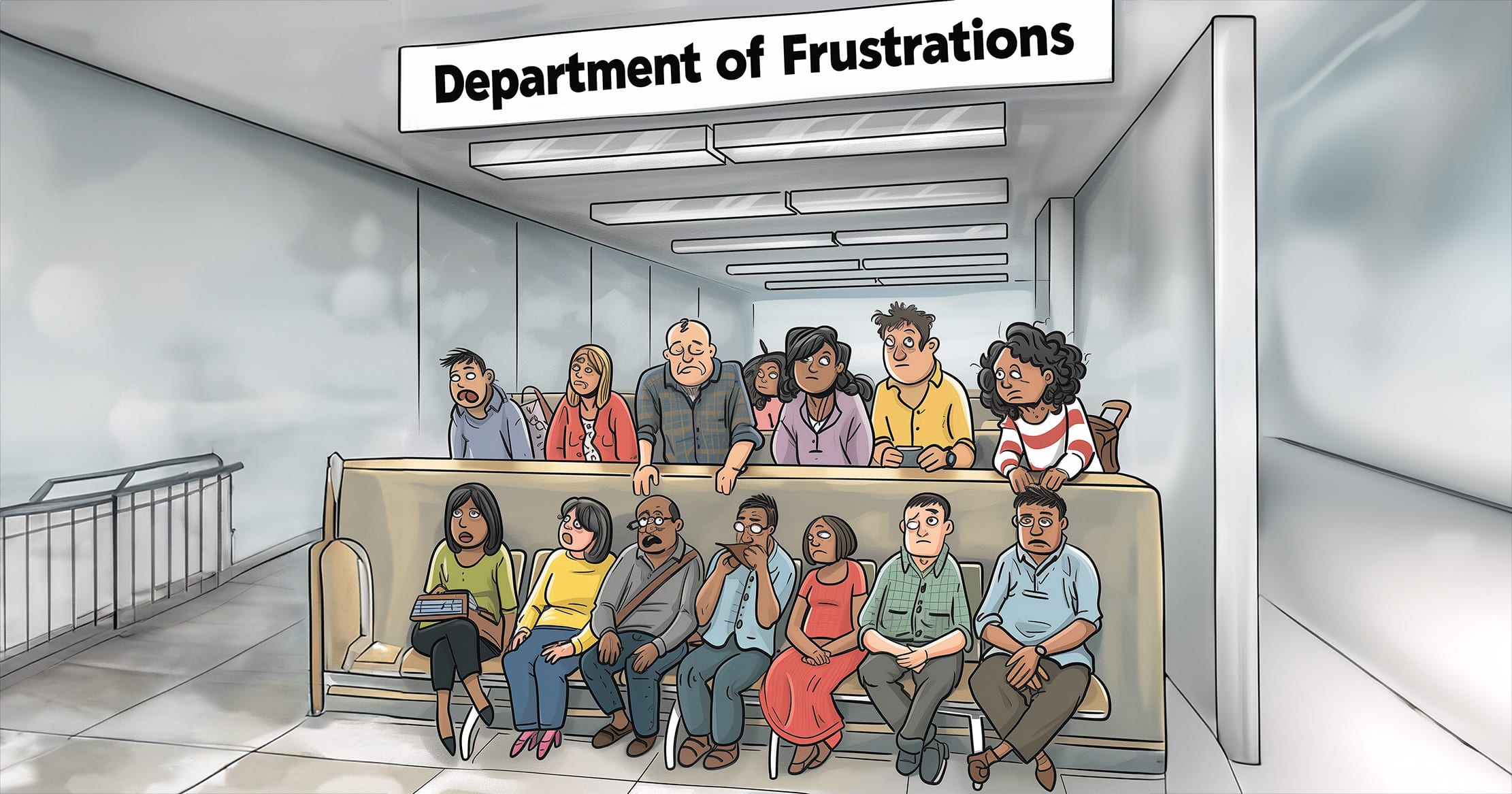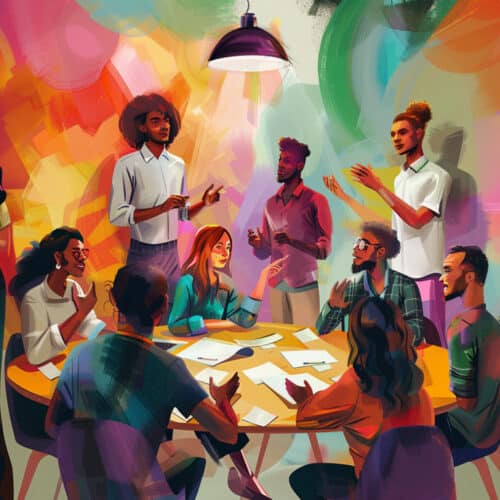“Great leaders are not defined by the absence of weakness, but rather by the presence of clear strengths.”
— John Peter Zenger
In our “City of Lights” series, we’ve delved into the unique roles defined by Patrick Lencioni’s model of Working Geniuses. Today, we venture into the dreaded Department of Frustrations, which is where we get reminded of the work we really don’t like to do even though maybe we keep doing it and have become really good at it. We get lectured on why we procrastinate and promise to do this work when we don’t want it. We struggle with what this means for our success and our identities as hard-working, talented people. This can feel like a dark and secret place where saying aloud: “I don’t really like doing this,” is forbidden. But if we are well-educated on the Six Types of Working Genius, we can let go of that judgment and guilt, roll up the shades and let the sun into the Department of Frustrations, and begin to understand that we are not alone and can greatly benefit from sharing the truth with others.
The Department of Frustrations gives everybody a short list of two types of work (2 Geniuses) we don’t really like. Work that drains us and leaves us feeling thirsty for the energy boost of doing what we really love. For each of us, two Geniuses can manifest as Frustrations. Understanding these Frustrations is key to navigating the complex dynamics of our City of Lights. Let’s explore how each Genius, when it shows up as a Frustration, can impact individuals and teams and how to manage these challenges effectively.
Learn how the Working Genius model can help your team – Pointerwise can help, learn more today
Wonder as a Frustration
When Wonder is a Frustration, individuals may struggle with engaging in or appreciating abstract, conceptual thinking. They might find brainstorming sessions unproductive or feel impatient with discussions that don’t have immediate, practical applications. This can lead to a culture where creative thinking is undervalued, potentially stifling innovation.
- Managing This Frustration: Encourage those who are frustrated by Wonder to contribute in ways that align with their strengths, such as focusing on practical implications or execution details.
Invention as a Frustration
Individuals for whom Invention is a Frustration may find it challenging to develop new ideas or solutions. They might prefer working with existing systems rather than creating something new, which can hinder innovation. In a team, this could lead to a reliance on tried-and-tested methods, possibly overlooking fresh opportunities.
- Managing This Frustration: Pair individuals with high Invention Frustration with strong Inventors. Encourage them to focus on refining and implementing ideas rather than originating them.
Discernment as a Frustration
 Those who find Discernment frustrating may struggle with analysis and decision-making. They might either rush to conclusions without fully considering the nuances or feel overwhelmed by the need to make judgments. This can lead to hasty decisions or analysis paralysis.
Those who find Discernment frustrating may struggle with analysis and decision-making. They might either rush to conclusions without fully considering the nuances or feel overwhelmed by the need to make judgments. This can lead to hasty decisions or analysis paralysis.
- Managing This Frustration: Provide clear frameworks and criteria for decision-making. Leverage team members who are strong in Discernment to guide and mentor.
Galvanizing as a Frustration
For some, the act of rallying others and inspiring action (Galvanizing) can be draining. They might be uncomfortable taking the lead in motivating teams or initiating action, potentially leading to a lack of momentum or direction in projects.
- Managing This Frustration: Allow these individuals to contribute to planning and strategizing, rather than leading the charge. Team them up with natural Galvanizers who can take on the role of motivator.
Enablement as a Frustration
Individuals who are frustrated by Enablement may find it challenging to provide support or assistance to others’ ideas or initiatives. They might prefer working independently or leading rather than playing a supporting role, which can affect team cohesion and collaboration.
- Managing This Frustration: Encourage them to take on roles that require more independence and leadership. Pair them with strong Enablers who can handle the supportive tasks.

Tenacity as a Frustration
Those who find Tenacity frustrating may struggle with following through and completing tasks. They might start projects with enthusiasm but lose interest over time, leading to unfinished tasks and unmet goals.
- Managing This Frustration: Break down tasks into smaller, more manageable goals. Pair these individuals with team members who have high Tenacity to ensure projects reach completion.
Maximize Your Team Strengths – Use the Working Genius assessment to align tasks with your team’s strengths
Embracing and Managing Frustrations in the City of Lights
Here are some examples of how these concepts might play out in our fictitious Working Genius City of Lights:
Wonder as a Frustration
Picture the city’s chief architect, tasked with dreaming up the future skyline, yet finding the blueprints and models exhausting rather than exhilarating. For them, engaging in abstract planning without immediate construction is frustrating. Instead, they thrive when translating grand visions into concrete building plans.
- Coping Strategy: The chief architect delegates the conceptual work to dreamers in the design studio, focusing their efforts on drafting the actionable plans that will bring those dreams to life.
Invention as a Frustration
Consider the city’s engineers who maintain the bridges and roads. They excel at keeping the infrastructure running but feel stifled when asked to design a new transportation system from scratch. Their frustration lies in the creation, not the care.
- Coping Strategy: The engineers collaborate with pioneering Inventors from the city’s innovation hub, allowing them to concentrate on improving and optimizing the existing networks.
Discernment as a Frustration
Envision the city’s budget analysts, who must sift through financial forecasts and proposals. Those who find analyzing the potential return on investment taxing will often rush to funding decisions, potentially leading to misallocated resources.
- Coping Strategy: These analysts work closely with their counterparts in the Economic Strategy Department, who have a keen eye for detail and can guide the decision-making process.
Galvanizing as a Frustration
Imagine the city’s event coordinators, charged with rallying the community for festivals and public projects. For some, the very act of inspiring crowds and spearheading campaigns is overwhelming, leading to subdued city celebrations.
- Coping Strategy: These coordinators partner with the charismatic leaders of community groups, who bring the spark and drive needed to energize the city’s residents.
Enablement as a Frustration
Think of the city’s support staff, whose role is to assist in the implementation of various civic projects. Some may find constant assistance draining, preferring to lead rather than support.
Coping Strategy: These individuals take on more autonomous projects, steering their own course, while teaming up with dedicated support staff who relish the role of assisting others and bolstering their initiatives.
Tenacity as a Frustration
Now, observe the city’s project managers, each with a portfolio of long-term developments. Those who lose steam as projects drag on find the push to completion a grueling marathon.
- Coping Strategy: These project managers break down the roadmap into a series of checkpoints and collaborate with the relentless finishers from the Department of Project Completion, ensuring each milestone is met with vigor.
 Our “City of Lights” shines brightly because it recognizes that each department head, worker, and citizen has unique strengths and inherent challenges. By facing their Working Genius Frustrations head-on, members of our city learn to assign the right roles to the right people, creating a harmonious and thriving metropolis.
Our “City of Lights” shines brightly because it recognizes that each department head, worker, and citizen has unique strengths and inherent challenges. By facing their Working Genius Frustrations head-on, members of our city learn to assign the right roles to the right people, creating a harmonious and thriving metropolis.
As we prepare to venture out of the Department of Frustrations and back onto the sunlit streets of our Geniuses, we understand that letting go of judgment and guilt about what we don’t love to do, and acting with strategic delegation are the keys to navigating our “City of Lights.” It’s not just about understanding our Working Geniuses but also about effectively managing our Frustrations to ensure that every citizen, every leader, and every team can thrive. It’s important to note that this does not mean we don’t have to do work in Frustrations. Every job, every role, is a 6-letter job requiring all 6 Geniuses to make it work. We all have to do work we don’t love. The key is to understand what we do and don’t love and how to work toward attracting more of the former and less of the latter.
Join us in our upcoming blogs as we continue to traverse the city, shining a light on how we can harness the full spectrum of our Working Geniuses and Frustrations to build a city that’s not just efficient, but effective and extraordinary.
“I make mistakes. I’ll be the second to admit it.” – Jean Kerr
Improve Team Dynamics – Book a free consultation to understand how our assessments can benefit your team






